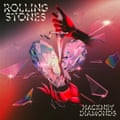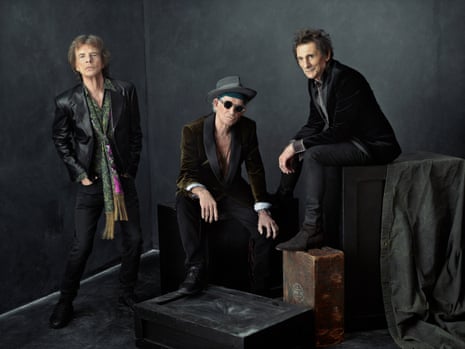The eighth song on the 24th studio album by the Rolling Stones is called Live By the Sword, a succession of variations on the titular maxim about dying by the sword. In truth, it’s not one of the strongest lyrics on Hackney Diamonds. You rather get the impression Mick Jagger came up with the song’s central conceit, realised he’d run out of ideas for variations on the aforementioned titular maxim around the end of the first verse, but boldly decided to press on regardless. “If you’re deep in the crime, you’re deep in the slime,” he avers. “If you live like a whore, you better be hardcore”: well, if you say so, mate.

Then again, you could make a convincing case that the lyrics scarcely matter. Live By the Sword is a raging blast that reunites the version of the Rolling Stones extant from the mid-70s to the early 90s – the drums were recorded by Charlie Watts at his final sessions before his death in 2021; Bill Wyman is on bass – with the addition of Elton John hammering away in the sideman role once occupied by the late Ian Stewart. Not for the last time on Hackney Diamonds, it recalls the moment in the late 70s when the Rolling Stones were briefly galvanised by the arrival of punk, whether they would have admitted it or not: it’s of a piece with Some Girls’ Respectable, Emotional Rescue’s Where the Boys Go and Neighbours, a refugee from the Emotional Rescue sessions that wound up on 1981’s Tattoo You. Jagger, meanwhile, sings the whole thing with yowling conviction, even when you haven’t got a clue what he actually means, as per the business about living like a whore. He sounds energised and engaged, a far cry from the Jagger you occasionally heard on Stones albums in the 80s and 90s, who didn’t seem to be singing so much as dutifully rearranging a collection of well-worn mannerisms and vocal tics to fit the songs.
And, in fairness, the lyrics occasionally essay a striking line. “If you live by the clock, you’re in for a shock,” sings Jagger at one juncture, which is among a number of lyrical references to the passing of time (“is my future all in the past?” asks Keith Richards on his solo turn Tell Me Straight) and a neat summation of the Rolling Stones’ more recent recording career. It is 18 years since they last released an album of original material, a pretty staggering gap, even by the standards of a band who clearly worked out in the mid-90s that the business of touring had become completely uncoupled from that of making albums: you no longer needed to do the latter in order to make millions doing the former. You might have been forgiven for believing that 2005’s A Bigger Bang would be the last album of their own songs the Rolling Stones would release, with 2016’s Blue & Lonesome a neatly cyclical finale: the Stones ending their recording career the same way they started it, with an album of blues covers.
That it isn’t may be down to Andrew Watt, who’s gone from working with Camila Cabello, Justin Bieber and Dua Lipa to a new role as producer by appointment to the rock aristocracy: Ozzy Osbourne, Elton John, Iggy Pop and Paul McCartney, who apparently recommended him to the Stones after sessions with Don Was floundered. Watt isn’t above catapulting his more venerable charges into the 21st century – he had Ozzy Osbourne singing through AutoTune on last year’s Patient Number 9 and did the same to Elton John on the Britney Spears collaboration Hold Me Closer – but he’s obviously realised that what a 21st-century audience wants the Rolling Stones to do is sound like the Rolling Stones.
The sparkle to the choruses of Angry and Depending on You (both co-written by Watt) suggest the presence of someone who knows how to make contemporary hits, and there’s a light modern sheen to the production that prevents it sounding like a determined recreation of the Stones’ past, even if guest star Lady Gaga nearly hospitalises herself trying to evoke the spirit of Merry Clayton, fabled Gimme Shelter guest vocalist, on Sweet Sounds of Heaven. But there’s nothing resembling the clumsy lunges for trip hop-inspired contemporaneity that ensued when the Stones employed the Dust Brothers and Danny Saber on 1997’s Bridges to Babylon and Mick Jagger has been mercifully dissuaded from calling once more on the services of British rapper Skepta. Indeed, Lady Gaga aside, the star guests stay off the mic and seem happy in the background. McCartney contributes an uncharacteristically distorted bassline to Bite My Head Off; both Elton John and Stevie Wonder stick to the piano stool.
Behind its terrible title, which makes the new Rolling Stones album sound like a pole-dancing club in Clapton, and its abysmal artwork, which makes it look like a mid-price hair metal compilation, what Hackney Diamonds has in profusion is really good songs: the ramshackle country honk of Dreamy Skies; the appealingly languid Driving Me Too Hard; Get Close, which hangs on a fabulous, quintessentially Keith Richards riff. Clearly the sessions weren’t without their hiccups – in a recent interview, new drummer Steve Jordan complained that the songs were “too poppy”, the guest stars superfluous and, tellingly, that Jagger and Richards should have produced it with his help – but the end product crackles with a sense of purpose: it’s hard to avoid the conclusion that, with mortality impinging on their thoughts after Watts’ passing, all concerned wanted the Jagger-Richards songwriting partnership to bow out with something noticeably stronger than A Bigger Bang.
If that was their aim, they’ve succeeded, coming up with that rarest of things: a latter-day Rolling Stones album that requires no special pleading. A sense of finality is added by the closing track, a raw, acoustic version of the song which gave the band their name, Muddy Waters’ Rolling Stone Blues, complete with the kind of shiver-inducing harmonica with which Jagger punctuated Blue & Lonesome and Richards playing a 1930s Gibson guitar similar to that used by the most legendary bluesman of the lot, Robert Johnson. It’s fantastic. “How do we finish?” pleads Richards on Tell Me Straight, a question to which Hackney Diamonds gives an emphatic possible answer.
after newsletter promotion

Comments (…)
Sign in or create your Guardian account to join the discussion